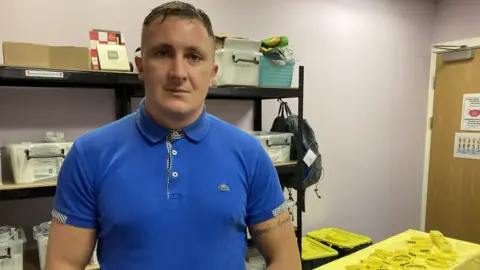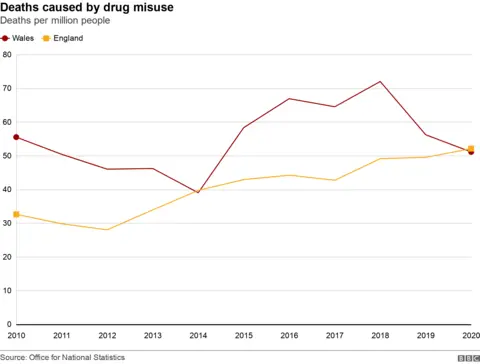Naloxone: The former boxer helping save drug users lives
 BBC
BBCA former boxer who overdosed three times is now training drug users to administer the medication that helped to save his life.
Naloxone temporarily reverses the effects of an opioid overdose, giving emergency services time to help.
Jamie Langridge said he lost friends who could have been saved if they had been treated with Naloxone in time.
"I lost 10 friends in two years. Three of them died in my arms," he said.
Jamie is just one of many former drug users who are now training others to administer Naloxone, as part of a peer-to-peer programme in Llanelli, Carmarthenshire. That programme is now in place across Wales.
When he was 22 Jamie turned to drugs after getting into a fight at a pub and being stripped of his boxing licence.
Up to that point Jamie said his whole life had revolved around boxing, working his way up the amateur leagues before winning a professional contract worth £500,000.
"Once that had all been taken away I had no purpose, nowhere to go," Jamie said, explaining how he ended up homeless, sleeping in doorways and eventually in prison.
After each overdose, Jamie was taken to hospital and given Naloxone treatment in time, but others were not as lucky.
"I lost 10 friends in two years. Three of them died in my arms," Jamie said.
"If it wasn't for Naloxone, I wouldn't be here and many of my friends wouldn't be either."
![BBC] Needle on a table](https://ichef.bbci.co.uk/news/480/cpsprodpb/106CD/production/_126977276_593fe6a0-d866-4145-aa2c-ff99ca3e9f71.jpg.webp) BBC]
BBC]Now 36, Jamie has saved four lives by administering Naloxone to people having an overdose, and is now learning how to train others as first responders.
Jamie said the training was helping with his recovery and explained meeting those addicted to drugs "reminds me of the sadness and desperation".
He has now been clean for three years and is training to become a drugs worker himself.
He said: "Rather than being a drain on society, I'm trying to make society better."
Between 2020 and 2021, Naloxone was used in response to 225 suspected opioid overdoses across Wales.
In 2021, the Welsh government and Gwent alcohol and drug service funded an eight-week pilot to train people with lived experience of addiction to give Naloxone to those at risk of overdosing.
The pilot was so successful, the training was extended across Wales.

In August, the latest Office for National Statistics data indicated Wales recorded a record number of drug-related deaths.
Charities in Wales hope initiatives like the peer-to-peer Naloxone programme will save lives and lower Wales' drug-related death rate.
Newport-based Kaleidoscope said it allowed vital medication to reach further into the community.
Elwyn Thomas, from the charity, said historically, people who use drugs "don't trust" drug workers, but "someone with the lived experience can actually go further into a community and into the areas that are devastated by drug use."
Kaleidoscope hopes to extend the peer-to-peer Naloxone program, so that peers also deliver sexual health training to drug users, and perform dry blood testing to identify bloodborne viruses.
